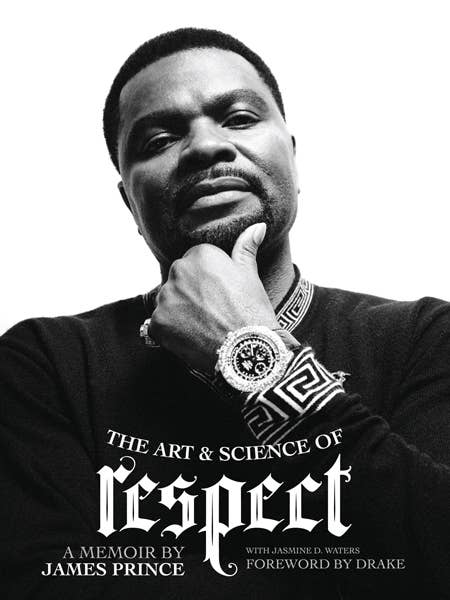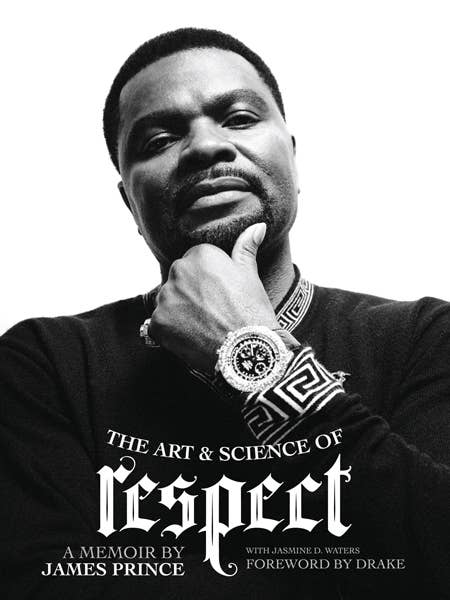
J. Prince is Rap's Godfather and he wears the title well. There are stories and myths about how he's handled business swirling since the internet was even thought of, some real, some fake, some exaggerated. Since 1986, his Rap-A-Lot record label, based out of Houston, set the standard for Southern independent labels like No Limit and Cash Money.
These days he chooses to be more behind the scenes, popping up for courtesy calls and to help mediate beefs between the likes of Drake and Pusha T. Lately, he's been on a press run promoting his new book The Art & Science of Respect: A Memoir by J. Prince that's been overshadowed by his involvement in advising Drake not to respond to Push's "Story of Adidon."
We talked to J. Prince about his the stories surrounding him, why he decided to step in and squash things between Drake and Pusha T, and his new book. He also speaks on his part in both the Biggie/Pac and Drake/Meek situations and elaborated on how his plans to create a union for rappers were thwarted by law enforcement.
Fans and people in the industry talk about you like you're the Godfather. How do you feel about that?
I mean, I don't try to be nobody other than who I am. I would look at that as somewhat of a symbol of respect. As long as they don't look at me as an enemy because there was people trying to kill the Godfather, so I don't want that side of the story [Laughs.] If it's respect in the loop, I can wear that.
You're on this press run to promote your book and it just so happen to coincide with this Drake/Pusha beef. Talk a little about your relationship with Drake.
My son Jas Prince discovered Drake. He played some of his music for me and I said, "Man, you like this?" I couldn't hear it at first but Jas convinced me that this was the new sound and to trust him. Then he says that Drake is buzzin' so I asked, where? Jas goes, "In Canada." [Laughs.] So I call some homies in Canada to check if the buzz was real and they confirmed that he was hot out there. We brought him down to Houston and my son introduced him to Lil Wayne and suggested that Wayne take Drake on tour and that's when he put his arm around Drake on stage.
Are you guys still connected business wise with him like management or is it more of a family situation?
Oh yeah, it's a combination of both. Jas has a record label and we've done a deal with Cash Money.
Immediately I knew, he crossed the line where music is concerned; it was personal with [Pusha].
When you first heard Drake's Pusha diss, "Duppy Freestyle," did you think things would escalate the way they did?
No, not at all, because I didn't hear anything to take it there. I understand that he mentioned the man's fiance, but it wasn't in a vulgar manner. I didn't see any signs of Pusha going where he went just based on that.
So when you heard Pusha's "The Story of Adidon" you knew this was going to be something different.
Immediately I knew, he crossed the line where music is concerned; it was personal with him.
You mentioned that this situation reminded you of Biggie and Pac.
Yeah, definitely, when you ignore this type of stuff. I know where this could go. I know how I felt about it. I can begin with me because I know his mother, I know his father, I know 40. I felt some kind of way. I was like, "Whoa, this dude is trying to go somewhere with this we don't need to go.
You tried to tell Biggie and Puff to leave LA before he was killed, right?
Yeah, I wanted to let them know that what I felt and what I heard in the streets. It wasn't safe for them to be in LA and I had the opportunity to share that information with both of them.
You step into situations out of love to try to squash these situations?
Definitely. I consider myself a man of peace and if I see someone that means something to me running towards a cliff, I'm going to say something.
So you're like the Godfather, you bring people to table because beef is bad for business.
Exactly, you can't ignore the business part and it's all you can do is try to bring people to the table.
Some people say that they don't feel bad for Drake in this case because he dragged on the Meek thing for months with memes and shit at OVO Fest. Why didn't you step in for Meek Mill like you did for the Drake/Pusha situation?
Actually I did [Laughs.] A lot of people don't know. I contributed to bringing peace to the Meek situation in a time where it was really needed.
You're highly respected by a lot of people in the game. Do you also have a relationship with Pusha's camp?
I don't know them personally and in passing have met. I do have more of a relationship with Kanye, though. Kanye works with one of my guys Mike Dean and Kanye used to come down to Houston way before he became this Kanye.
So you called Kanye on the phone and that's when he put that tweet out?
That ain't the way it went. Actually, I had heard from Kanye before that tweet came out. He called me and let me know that he's a family man, and not about that.
I was watching your recent appearance on Desus & Mero, which mentioned Vanilla Ice. Did you see him as this white boy trying to rap or did you see dollar signs?
I heard "Ice Ice Baby" and I knew it could be something and then I also saw talent. I watched him onstage performing and I think this was around the same time MC Hammer was doing his thing. I viewed him as a white MC Hammer.
Do you have any other regrets in terms of missing out on talent?
I had the chance to get Too Short and Destiny's Child. That environment I was dealing with where rappers were concerned, I didn't want to bring young girls around that.
Talk about the book.
With the book I had the opportunity to share my wisdom, my knowledge, my wins, my losses, and everything in between with everybody. I'm a guy that started from nothing, so I'm sharing how I turned nothing into something and the blueprints in which I followed to do these different things. It's full of influential and spiritual ingredients.
What's one of your favorite topics you touch on in the book?
There's a chapter called "The Biggest Deal I Ever Made" and that consists of me walking away from the streets into corporate America. I gave up that life, that struggle, that whole environment for corporate America. I consider it the biggest deal I ever made because if I had not done that, I wouldn't be here having this conversation with you today.
Are there similarities between the streets and the rap industry?
Yeah, I've used a lot of techniques that I got...[Laughs.] You have to admit, you're dealing with a lot of guys that come from the streets, so you can't act like this is a totally different world. It is certain aspects but that individual is who he is and I am who I am.
You do a lot of community work in Houston. I get why it's important, but why is it important to you?
Well, I couldn't be who I am today. I'm from 5th Ward and the people and the environment of the 5th Ward played a role in molding me into who I am today. So for me to become successful and disown where I came from, as a man I wouldn't feel complete. I'm always trying to uplift my community and give back to inspire and motivate.
Another story floating around is that you, Suge Knight, and Irv Gotti were trying to start a union for rappers and a distribution label.
We wanted to make the first black-owned distribution company. We were serious about that. We wanted to have something of our own because we understood the politics that went on with the majors. And in the midst of having that mindset and planning to do that, all of our labels were hit by some type of law enforcement raids.
You think those raids had something to do with your plans?
I wouldn't be surprised. They hit all of us.
What's the biggest difference between the record industry back then and now?
I think what we did back then laid a strong foundation for the youth to build on, and they're more in an independent state of mind right now than I ever witnessed. I like that side of the situation. But when you bring social media into it, this is day and night. We didn't have access to that power. Today they can just mash a button and put records out. This is something it took us six months to do back then. It took me a half a year to take a record like "My Mind Playing Tricks On Me." We had to break in this city, break in that city, give it to DJs and college radio, nourish it, politic it. I think that's a beautiful thing.
Are we gonna get any more courtesy call album intros from you?
You never know. I'm in the Hall of Fame right now but I'll come out for certain reasons.
People are terrified of your voice, man. You should have an audio companion to the book and just talk shit.
I hate that [Laughs.] I don't want people to feel that way about my voice.

